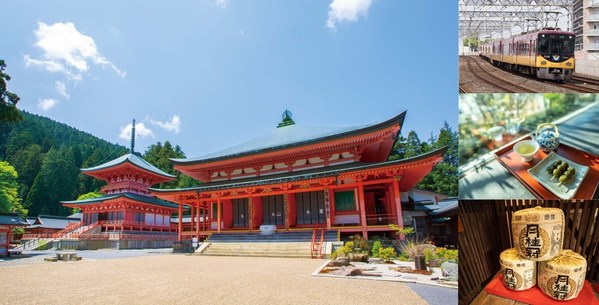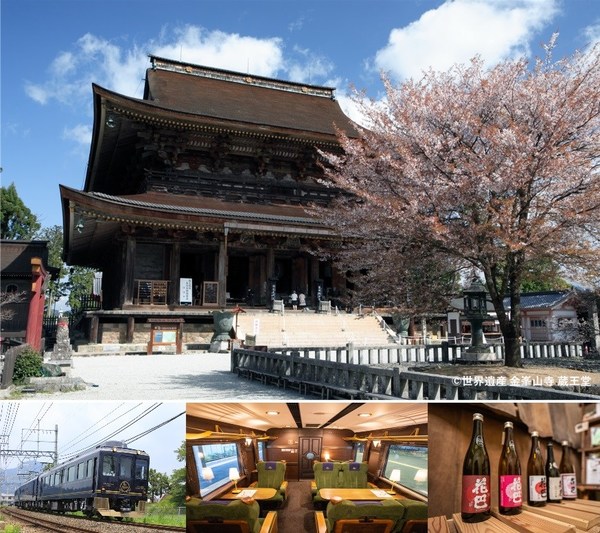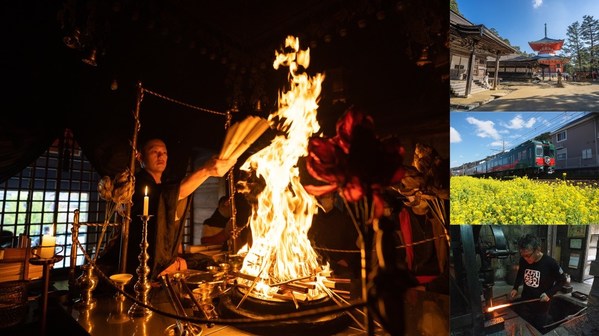OSAKA, Japan, Feb. 11, 2022 /PRNewswire/ -- The Kansai region of Japan has always been a popular travel spot for tourists from overseas. In addition to taking measures towards the pandemic, three railway companies, Keihan Holdings Co., Ltd.,Kintetsu Railway Co., Ltd. and Nankai Electric Railway Co., Ltd., are working together to widely introduce tourist spots that are suitable for in-depth travel experiences along the railway lines to overseas tourists. This is in preparation for the day when foreigners can freely visit Japan again in the future.
This collaboration is part of the Visit Japan program. In addition to tourist spots that are already popular, the program covers in-depth travel courses that are not yet known to many people and won't be crowded -- spots that are gaining attention due to the pandemic. These new spots can be easily visited by boarding a Keihan, Kintetsu, or Nankai train.

Left: Hieizan Enryakuji Temple, a World Heritage Site. Top right: The Keihan train is a convenient way to get to Uji from Osaka or Kyoto, or to Otsu City in Shiga Prefecture. Middle right: In Uji City, Kyoto Prefecture, the home of matcha green tea where many tea shops stand along the Byodoin Temple, where you can also enjoy matcha green tea sweets. Bottom right: Tourists can learn about the history of sake and how to make it at the Gekkeikan Ōkura Memorial Museum.
Uji City (Kyoto Prefecture)
In Uji City, Kyoto Prefecture, the home of matcha, there is a world-famous world heritage site known as Byodoin where you can enjoy the different scenery of the four seasons throughout the year, including cherry blossoms in spring, wisteria in early summer, and autumn leaves in autumn.
Many valuable national treasures are also stored in Hoshokan Museum which is located in the area. At the Taihoan tea house operated by Uji City, you can experience the ichi-go ichi-e (one time, one meeting) spirit in the aesthetics of Japanese tea ceremony by making matcha green tea in front of tourists and serving it with seasonal Japanese sweets for a reasonable price.
Historical Park of Tea and Uji Town, located next to Keihan Uji Station, was fully opened on October 1, 2021. In addition to a garden and resting area, there is a museum where visitors can learn about the history of Uji tea, and a restaurant that serves matcha sweets, making it a place where people can interact about Uji tea and promote tea culture.
Otsu (Shiga Prefecture)
Located in Otsu City, Shiga Prefecture, east of Kyoto Prefecture, is the sacred site of Japanese Buddhism, Hieizan Enryakuji Temple, a World Heritage Site opened in the 8th century by Saichō (Dengyō Daishi), covering an area of 1,700 hectares. The Sakamoto Cable (Car) takes you to the top of the mountain, and along the way you can enjoy the beautiful scenery of the surrounding forest and Lake Biwa, the largest lake in Japan. At Enryakuji Temple, you can also enjoy refined Buddhist (vegetarian) cuisine that uses local ingredients and no animal ingredients. In addition, you can experience the life of a monk by participating in Zen meditation, sutra copying, and shukubo (temple lodging).
In Otsu City, there is Ogoto Onsen, which is blessed with excellent location. The area nearby is full of ryokans (Japanese inns) that have guest rooms with private hot spring baths (including open-air hot spring baths) where you can enjoy the tranquil scenery of Lake Biwa while soaking in the hot spring without going outside. With a history of 1,200 years, Ogoto Onsen is known as one of the best hot springs in Japan with beneficial effects for skin, and is especially popular among female visitors. The hot spring is highly alkaline with a pH value of 9.0. After soaking in the hot spring, you can enjoy benefits including skin smoothing, muscle pain relief and recovery from fatigue.

Top: "Kinpusenji," the symbol of Mount Yoshino. Bottom left: "Blue Symphony," Kintetsu's sightseeing train provides a comfortable ride between Yoshino and Osaka. Bottom middle: The interior of Blue Symphony's luxurious design. Bottom right: Miyoshino Sake Brewery's brand sake "Hanatomoe" has been deeply accepted by sake lovers in Japan and abroad for its natural acidity and powerful flavor brought about by nature.
Yoshino (Nara Prefecture)
The Yoshino area in Nara is famous for Mount Yoshino, a sacred place for cherry blossoms, where you can fully enjoy shiroyamazakura cherry blossoms. Besides the scenery of cherry blossoms every spring, the local culture-related industries of Yoshino are closely related to the surrounding nature. Sake brewing is thriving, and Miyoshino Sake Brewery uses a traditional brewing method using natural yeast that are placed vats made of local Yoshino cedar wood. The local sake brand Hanatomoe, which is brewed in a wooden vat, is deeply appreciated by sake lovers in Japan and abroad for its woody scent, natural acidity and powerful flavor.
Kinpusenji Temple, the symbol of Yoshino, is the central training place of the traditional Japanese ascetic tradition of Shugendō, and the Zao-do main hall there enshrines the Buddha Zao Gongen. Zao-do is currently being renovated and it will be completed around March this year in preparation to welcome visitors. If you board Blue Symphony, a sightseeing train operated by Kintetsu, you can travel between Yoshino and the central areas of Osaka at a leisurely pace. On the luxuriously designed train, you can beautiful scenery along the train's route and enjoy locally made sake and exclusive cakes.

Left: "Mount Koya", a World Heritage Site. Tourists can feel the solemn and sacred atmosphere of religion by staying at a shukubo (temple lodging) and participating in a monk's morning service. Upper right: "Danjo Garan," one of the sacred places of Mount Koya. Middle right: Nankai Electric Railway's sightseeing train "Tenku" provides a comfortable ride from Osaka to Mount Koya. Bottom right: Sakai knives manufactured in Sakai City are highly regarded all over the world. At the knife factory, Tourists can experience the craftsmanship up close.
Sakai (Osaka Prefecture)
Sakai City in Osaka Prefecture is known for its tea ceremony culture and industries such as traditional cutlery with renowned brands like Sakai knives. The World Heritage Site of Mozu and Furuichi Tumuli Clusters includes the Tomb of Emperor Nintoku as well as the Kami Ishizu Misanzai Kofun Tomb. The visitor center there introduces the history and culture of the tumuli clusters, and aerial images are shown in a 3D theater located inside the center. After being registered as a World Heritage Site in 2019, the Mozu and Furuichi Tumuli Clusters has been attracting attention from Japan and abroad, and related organizations are considering using Gas balloons to provide tourists with a complete aerial view of Sakai City and the tombs.
Kōyasan (Wakayama Prefecture)
Kōyasan (Mount Kōya), located in Wakayama Prefecture, is the head temple of the Shingon sect of Buddhism, founded by Kukai (Kobo-Daishi), and has a history of over 1,200 years. Of the 117 temples starting with Kongobuji Temple, Danjō-garan and Okunoin are the most popular among tourists. In Kōyasan, where there are many scenic spots and historical architecture, there are shukubo (temple lodging) where guests can stay overnight. You can experience the solemn and sacred feel of religion and simple lifestyle of monks by enjoying Buddhist (vegetarian) cuisine in the morning/evening and participating in the morning service of monks.
If you board the Tenku (Nankai Electric Railway) sightseeing train, which travels through a mountainous terrain with a maximum height difference of 443 meters between Koyasan and Osaka, you can enjoy the ever-changing scenery of the surrounding forests and valleys and the beauty of the four seasons from the windows of the train.
Details on these activities and the area can be found in the February 11, 2022 issue of the Hong Kong "U Magazine".
Currently, measures are being taken to prevent the spread of the coronavirus except in some areas. Preparations are continuously being made in tourist spots to make foreigners feel safe and secure and to provide a new travel experience when the foreign tourists return to Japan.